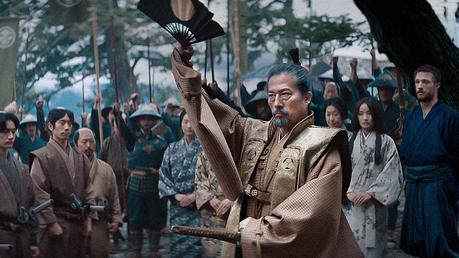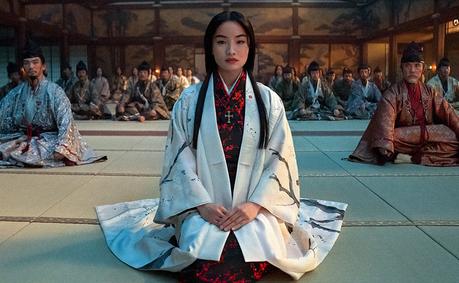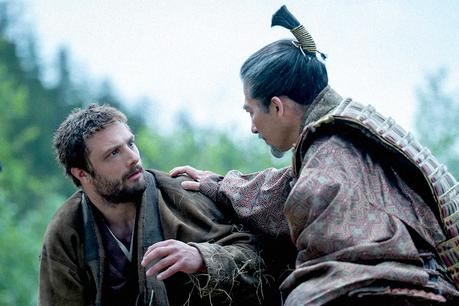Set in the pivotal moments of the Japanese Sengoku era, Shōgun sets the plot in motion ironically with the death of the last shōgun (inspired by the taiko — Hideyoshi Toyotomi). Before his passing, the taiko has appointed a council of regents to fill the power vacuum until his heir comes of age. Among the regents, Lord Yoshii Toranaga (portrayed by Hiroyuki Sanada) stands out with his warfare wisdom and sharp political maneuvers. That brings him to a feud with fellow regents masterminded by Lord Ishido (Takehiro Hira). The political scrutiny coincides with the arrival of John Blackthorne (Cosmo Jarvis), the stranded Englishman with a hidden agenda. Their fate intertwines in a dragon-less game of thrones that challenges the peripheral vision the early adaptation brought.
FX/Hulu’s latest rendition of James Clavell‘s historical fiction, Shōgun, is not a mere redux of NBC’s 1985 adaptation starring flamboyant Richard Chamberlain as the Anjin – Blackthorne’s moniker given by his Japanese lord. It offers a new reading of the source material to appeal to modern audiences with a more profound sensibility and understanding of cultural notes. There’s deeper intimacy and even deeper discourse between more characters that speak volumes without sacrificing grandiosity and big-budget spectacles that come with its massive production.
Growing up with films like Lawrence of Arabia, Amistad, The Last Samurai, or The Great Wall, I became skeptical about how this mini-series would tackle its cultural clash narrative without succumbing to the usual white-savior story. Clavell‘s novel, albeit a fictional surrogate to the rise of Tokugawa, gives his white protagonist a little too much on his plate and subconsciously puts the Japanese warlords and samurais alike as mere decorations to Blackthorne’s spiritual journey. However, the new Shōgun tests such skepticism with a perceptive remapping of the narrative structure and character dynamics.
There’s an on-screen saying that perfectly envelops the brilliant remap. In the series, Japanese people believe that every man has three hearts. The first is in the mouth for the world to see; the second is the chest just for friends or closest allies; and the third is the secret heart, buried deep where no other man can find (or, at least, no other living man can find). Every man must keep his secret heart hidden to survive the unforgiving world. What the “heart” means remains ambiguous throughout the story; it might refer to “feeling” or “ambition” for all we know, but there lies the virtue that encompasses all the questions in Shōgun without having to dictate the answers.
 Hiroyuki Sanada portrays Yoshii Toranaga – inspired by Ieyasu Tokugawa – in Shogun (2024)
Hiroyuki Sanada portrays Yoshii Toranaga – inspired by Ieyasu Tokugawa – in Shogun (2024)
One In His Mouth for the World to See
The first one to falter is the perspective. We know a great war is looming on the horizon, but when we first learn how the friction comes to fruition, there isn’t a clear sign of hostility. Even when we first see how Lord Torinaga is accused of threatening the country’s stability, the show stages it in an open forum of calm, mild-mannered gentlemen. In this world, however, we will soon learn that silence doesn’t mean ignorance; calmness isn’t acceptance, and manner is not a sign of weakness.
Duty and honor work differently in feudal Japan than in Western historical stories. Bringing shame to a lord you pledge allegiance to may result in a death penalty, even when what you do is practically defending his innocence. Torinaga is calm and composed throughout the ordeal, but his eyes are set straight on the next move that only his inner hearts know. The heart in his mouth, on the other hand, says something differently as he condemns his bannerman to commit seppuku for taking insult to Lord Ishido’s accusation. There’s no objection, but his eyes glare — compelling me to question it. Was it disappointment or remorse? Shōgun never explicitly answers to that, even after the finale. And this tragedy happens in the first episode.
When Blackthorne enters the picture, he is a proud man who believes that the Europeans are the pinnacles of civilization. Even in a perilous situation, he still thinks he’s got a chance to plunder the people he considers godless savages. Unbeknownst to him, the feudal Japan is a world away from what he initially perceives. In fact, the Japanese consider him and the rest of the crew filthy barbarians. Even the villagers stare at him as if he’s a specimen from the freak carnival. In this sense, this show proves the intent to portray this story from a completely different perspective. The way ahead of Blackthorne seems long and winding, with a bit of curiosity here and there that things will turn around. This perspective shift reminds me a little of Martin Scorsese‘s Silence, albeit on different subjects.
Returning to the original text, the heart in the mouth is false. What is perceived upfront is sometimes different from what it implies. This is a recurring theme in Shōgun —a key to delving deeper into its protagonist’s psyche, which has remained obscure to this point.
 Anna Sawai delivers an Emmy-worthy performance as a duty-bound lady, Mariko
Anna Sawai delivers an Emmy-worthy performance as a duty-bound lady, Mariko
Another in His Chest Just for His Friends
Lady Mariko (a stellar performance by Anna Sawai) will make the grand entrance next. With her entering the picture, the show penetrates a new territory that will further separate it from the sensibility that the 1985 adaptation shows. Subtitles in the 1985 version are unavailable, proving a big deal in nullifying its relevance to today’s sensibility.
It was a daring yet gullible creative decision; by doing so, that version provides an immersive experience for mostly Western audiences knowing only English, just like Blackthorne. Dialogues are primarily presented through interactions between him and Mariko, who acts as his interpreter. This interaction works not only to convey the message but also to become the catalyst of Blackthorne and Mariko’s star-crossed subplot that further cements the Englishman’s role in the grand scheme of things and, at the same time, forces the intriguing Japanese characters into the background — further proving the naive white-savior sentiment.
Showrunners Justin Marks and Rachel Kondo are aware of this sentiment; therefore, they decide to provide carefully crafted subtitles charting all the essential characters on the map. After all, this is a story of power struggles between Japanese warlords only observed by a Western outsider, not the other way around. That way, the show treats most characters equally, leaving the deeds that matter to the plot.
Providing subtitles doesn’t necessarily strip down Mariko’s role. By doing so, Shōgun adds trust into the equation to observe the second heart – the one in the chest for the allies. Mariko arrives just as Blackthorne doubts a Jesuit priest Torinaga assigns to translate the conversation. She validates the translation and later jumps into the conversation herself, putting context and insight into each dialogue, giving us a deeper understanding of duty and honor. She brings trust into the picture; that kind of trust is what you can only reveal to your allies.
She still is a love interest, to some extent. Yet, her relationship with Blackthorne isn’t necessarily the plot; it further serves the narrative insistence on duty and honor. Her story is an unending battle for redemption due to her dishonored past (his father’s character is inspired by Mitsuhide Akechi) and her struggle as a woman of that era. If anything, her connection with the Anjin is permanently attached to the picture that Toranaga sees in his secret heart.
Sawai adds a perfect prompt for Toranaga’s covert scheme in her portrayal of Mariko. She has transformed her character into the plot itself and not another damsel in distress or someone who has been a mere victim of the situation. Her character might not be clad in armor or speaking in a brash way, but the strength she’s harboring emanates from her eyes — penetrating even the language and cultural barrier that have always been one of the show’s central themes.
 Cosmo Jarvis as the disillusioned fool is confronted by Hiroyuki Sanada portraying a visionary leader – opposite ends of a pole
Cosmo Jarvis as the disillusioned fool is confronted by Hiroyuki Sanada portraying a visionary leader – opposite ends of a pole
A Secret Heart Buried Deep Where No One Can Find
What stands out in the new Shōgun is how it consistently adheres to the perplexing three–hearts philosophy—especially the secret heart idea. The concept creates a good structure for most elements in the show, from the narrative and characters’ motivation as well as presentation to how the plot subverts the source material’s idea.
The cheat sheet becomes apparent in hindsight. To survive the stark, cunning world of this Sengoku Japan is not to let the secret heart known to anyone (or at least to anyone alive); when a character deliberately or unintentionally reveals that, it’s an inevitable demise for them. FX/Hulu’s Shōgun does an excellent job keeping this principle like a promise.
Tadanobu Asano‘s Kashigi Yabushige is a perfect embodiment of the three-heart principle. When we first see him, Yabushige appears enigmatic — difficult to decipher through the first impression. As Toranaga’s vassal, he seems to work around his own clock. He seems to despise the barbarians to the extent that he revels in the sound of their death rattle; the next thing we know, he’s making a strange connection with Blackthorne, taking his fascination with him and letting the audience know about that.
His relationship with Toranaga is also bizarre; he seems doubtful of his liege’s scheme, but his duty compels him to play along even at the expense of his idealism. Through the ambivalent relationship between him and the Englishman, we observe his allegiance to the lord of the Kanto region. Examining how the three-heart philosophy works through Yabushige might be the best shot at understanding where the show is heading.
In contrast to Yabushige, the show takes a more drastic turn in depicting how the same principle works on Blackthorne. The show subverts his pivotal role, which the source material has always been fond of caressing, limiting him to only observational. After all, the “three hearts” is an alien concept for the Englishman; he only learns of it from a fellow European, Vasco Rodrigues (Néstor Carbonell), whose comprehension we cannot confirm.
Blackthorne wears his heart on his sleeves throughout the story, at least until he realizes what the principle means to the lives of everyone who cares for him in such a strange land. The language barrier practically “saves” him; therefore, his relationship with Mariko is crucial in ensuring his survival. This is where the show cleverly subverts the white-savior tropes to its own advantage.
The three-heart concept shapes the power dynamic between its equally intriguing characters. Shōgun doesn’t aim to develop characters that we can unequivocally support, but the show doesn’t want you to blindly despise them either (this is what Game of Thrones does between spawning ambiguous characters every now and then). To complete the triumvirate of how the show observes such a concept, I reflect on Toranaga’s depiction.
Through the lens of the FX/Hulu show, the closest character to claim the protagonist title is Toranaga. Shōgun depicts him as a man of duty who sometimes takes extra steps to safeguard his family and country rather than bending it to his will. However, it’s relatively easy to mistake him for a Japanese Ned Stark. What separates him from George RR Martin‘s character is how he never spills his secret heart to practically anyone alive, and that speaks irony. His vision seems baffling but never out of reach. He sees a hundred yards ahead of everyone else; for that reason, he is prepared to manipulate and discard others to advance his objectives. By the end of the series, we’ll learn what his secret heart desires, but there will be no going back. When that moment arrives, all that’s left is a contemplation of how this world works — nobody is exclusively compassionate or evil; instead, everyone is driven by reasons and impulses.
Verdict: Shōgun is a terrific story of subversion and ambition, all driven by humanity’s primordial desire, reflected in the concept of the three hearts.
